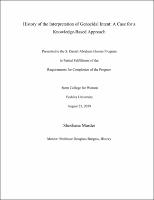Please use this identifier to cite or link to this item:
https://hdl.handle.net/20.500.12202/4755Full metadata record
| DC Field | Value | Language |
|---|---|---|
| dc.contributor.advisor | Burgess, Douglas | - |
| dc.contributor.author | Marder, Shoshana | - |
| dc.date.accessioned | 2019-10-07T17:44:10Z | - |
| dc.date.available | 2019-10-07T17:44:10Z | - |
| dc.date.issued | 2019-08-23 | - |
| dc.identifier.citation | Marder, Shoshana. History of the Interpretation of Genocidal Intent: A Case for a Knowledge-Based Approach Presented to the S. Daniel Abraham Honors Program in Partial Fulfillment of the Requirements for Completion of the Program Stern College for Women Yeshiva University August 23, 2019. | en_US |
| dc.identifier.uri | https://hdl.handle.net/20.500.12202/4755 | - |
| dc.description | Honors thesis | en_US |
| dc.description.abstract | This paper aims to analyze the intent requirement of the crime of genocide, ultimately arguing that genocidal intent be interpreted through a looser knowledge-based approach that is complementary with the history of intent in the Genocide Convention. Through analysis of the works of Lemkin and the drafters of the Genocide Convention, it will be shown that though intent is essential in the crime of genocide, neither of these foundational sources provide a clear indication or consensus on the type of intent “intent to destroy...as such”3 indicates. It is thus necessary to turn to other international documents and case law to determine what is genocidal intent. It will be argued that both the International Law Commission (ILC) and International Criminal Court (ICC) indicate that genocidal intent is a higher level of intent than general intent, but they do not dictate that a strict approach of specific intent must be adopted. Finally, it will be shown that though the cases of Akayesu in the International Criminal Tribunal for Rwanda (ICTR) and Jelisić in the International Criminal Tribunal for Yugoslavia (ICTY) seem to provide slightly different approaches to genocidal intent, the recent Karadžić conviction of the ICTY indicates that genocidal intent be interpreted through a loose knowledge-based approach. In addition to complementing case law and international treaties on genocide, a looser knowledge-based approach as articulated in the Karadžić trial allows courts to actually prosecute perpetrators of genocide and, in doing so, protect vulnerable groups from persecution as per the original purpose of the Genocide Convention while vindicating the suffering of victims. | en_US |
| dc.description.sponsorship | S. Daniel Abraham Honors Program | en_US |
| dc.language.iso | en_US | en_US |
| dc.publisher | NY: Stern College for Women. Yeshiva University. | en_US |
| dc.rights | Attribution-NonCommercial-NoDerivs 3.0 United States | * |
| dc.rights.uri | http://creativecommons.org/licenses/by-nc-nd/3.0/us/ | * |
| dc.subject | Honors student thesis | en_US |
| dc.title | History of the Interpretation of Genocidal Intent: A Case for a Knowledge-Based Approach. | en_US |
| dc.type | Thesis | en_US |
| Appears in Collections: | S. Daniel Abraham Honors Student Theses | |
Files in This Item:
| File | Description | Size | Format | |
|---|---|---|---|---|
| Shoshana Marder OA Honors Thesis_Aug2019.pdf | 270.72 kB | Adobe PDF |  View/Open |
This item is licensed under a Creative Commons License

